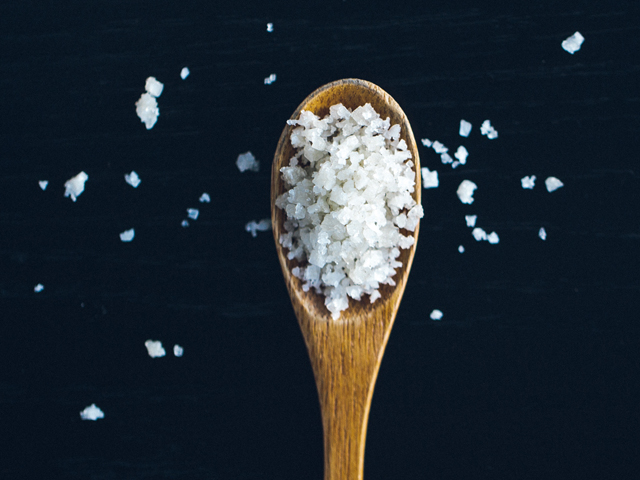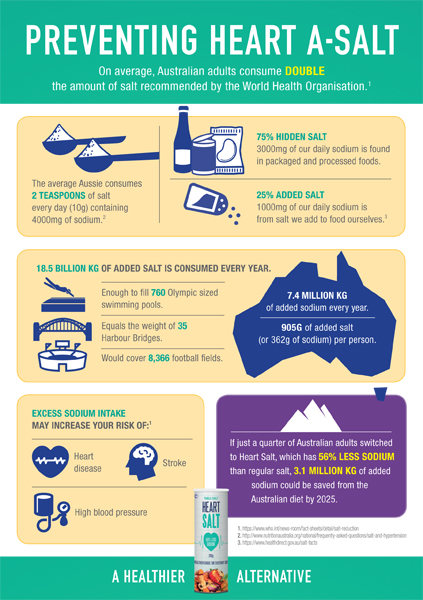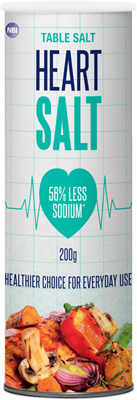Joel Feren Heart SALT Interview

Aussies Eating More Then 760 Pools worth of Added Salt Every Year
Salt may be essential for life, but Australians are eating far too much. According to the National Health and Medical Research Council, the average Australian adult consumes about 2 teaspoons or 4000mg of sodium every day. This equates to almost double the sodium levels required for good health prescribed by the World Health Organisation.
While some of the salt we eat is out of our hands, with approximately three-quarters of our sodium intake coming from salt found in processed and packaged foods, 25% is salt that we choose to add to meals ourselves.
 In fact, based on Australian population statistics from the 2016 Census, Australian adults are collectively consuming more than 7.4 million kilograms of added sodium, enough salt to fill 760 Olympic-sized pools, every year*. This excess sodium in our diet has led to an increase in heart disease, stroke, high blood pressure and other health issues associated with a high sodium intake.
In fact, based on Australian population statistics from the 2016 Census, Australian adults are collectively consuming more than 7.4 million kilograms of added sodium, enough salt to fill 760 Olympic-sized pools, every year*. This excess sodium in our diet has led to an increase in heart disease, stroke, high blood pressure and other health issues associated with a high sodium intake.
To help Australians combat their negative sodium habits, Neptune Bio- Innovations has launched Heart SALT, a healthier heart alternative to regular table salt. With 56% less sodium it tastes just like regular salt and is a good step you can take to reduce your overall salt intake.
Modelling suggests that by 2025, Australians will have consumed 37.2 million kilograms of added sodium. But by cutting down our bad behaviour around salt and making more health-positive choices, we could see a decrease in our sodium-induced health risks.
John Cox, Head of Marketing at Neptune Bio-Innovations explains: "Our mission is to help Australians reduce their added sodium levels whilst still being able to enjoy salt on their food. If only a quarter of Australian adults make the switch to Heart SALT, which has 56% less than regular table salt, in those five years we could reduce our collective added sodium intake by 3.1 million kilograms**."
Accredited Practising Dietitian and 'The Nutrition Guy', Joel Feren adds: ""We know that Aussies love the taste of salt. The habit of adding salt to our food appears to be a deeply ingrained one. However, products like Heart SALT along with other tips on how to choose lower sodium packaged foods could really benefit our overall heart health."
To celebrate Salt Awareness Week (4th-10th March 2019) and encourage Australians to consume less sodium, Heart SALT is releasing a humorous short film about the impact our salty behaviour and naughty eating habits can have on your heart. Complete with catchy lyrics, the film aims to start an online conversation about the impact of sodium on our health.
Heart SALT is available in 200g and 400g shakers at Coles supermarkets nation-wide or via the Neptune Bio-Innovations website at heartsalt.com.au. RRP $2.99 for the 200g shaker and $5.75 for the 400g shaker.
Interview with Joel Feren, Accredited Practising Dietitian
Question: What is Heart SALT?
Joel Feren: Heart SALT is a clever alternative to regular table salt. It has 56% less sodium, the stuff that increases our risk of heart disease, than it's counterpart.
 Question: Why was Heart SALT created?
Question: Why was Heart SALT created?
Joel Feren: It all came down to taste. While low sodium salt has been available for years, there was a lack of authentic low-sodium alternatives that tasted the same as regular table salt. We wanted to create a product that allowed Australians to continue their salt usage but with reduced negative health effects.
Question: How does Heart SALT compare to regular table salt?
Joel Feren: It has 56% less salt than regular table salt making it a suitable alternative for heart-health conscious Aussies.
Question: What message do you hope to spread with the launch of Heart SALT?
Joel Feren: Heart SALT's mission is to help Australians reduce their added sodium levels whilst still being able to enjoy salt on their food. If only a quarter of Australian adults make the switch to Heart SALT, which has 56% less than regular table salt, in those five years we could reduce our collective added sodium intake by 3.1 million kilograms.
Question: How much added salt are Australians actually consuming?
Joel Feren: According to the National Heart Foundation Aussies are consuming 9 grams of salt every day, which is about 1 teaspoon more than what is recommended. It is estimated that if we slashed our salt intake to just 6 grams of salt a day, it would prevent 6000 deaths each year from heart disease and stroke.
Question: How can Australians slash their salt intake?
Joel Feren: The good news is we can reduce our salt intake without sabotaging taste and flavour. There are some simple steps we can all take. For example, eat mainly fresh and natural foods, experiment with herbs and spices, choose packaged products with less than 400mg of sodium per 100g (extra points for products with less than 120mg per 100g) and prioritise fruit and vegetables – they are chock-a-block full of potassium, which is sodium's adversary. Potassium helps to reduce blood pressure.
 Question: What should we look for on nutritional labels in regards to reducing our salt consumption?
Question: What should we look for on nutritional labels in regards to reducing our salt consumption? Joel Feren: If you know what's in your food, you can make more nutritious and more informed choices about what to eat and what to leave on the supermarket shelf. When it comes to sodium, choose products with less than 400mg per 100g. Better yet, select foods with less than 120mg of sodium per 100g – it's the gold standard!
Question: How does excessive sodium affect our body and health?
Joel Feren: A diet high in salt can lead to an increase blood pressure, as the extra salt in the blood vessels is chaperoned by additional water. This causes additional strain on your heart to effectively pump the blood around the body. Decreasing salt in your diet can ease the pressure on your blood vessels and reduce the load on the heart. It may just save your life.
Interview by Brooke Hunter
MORE



